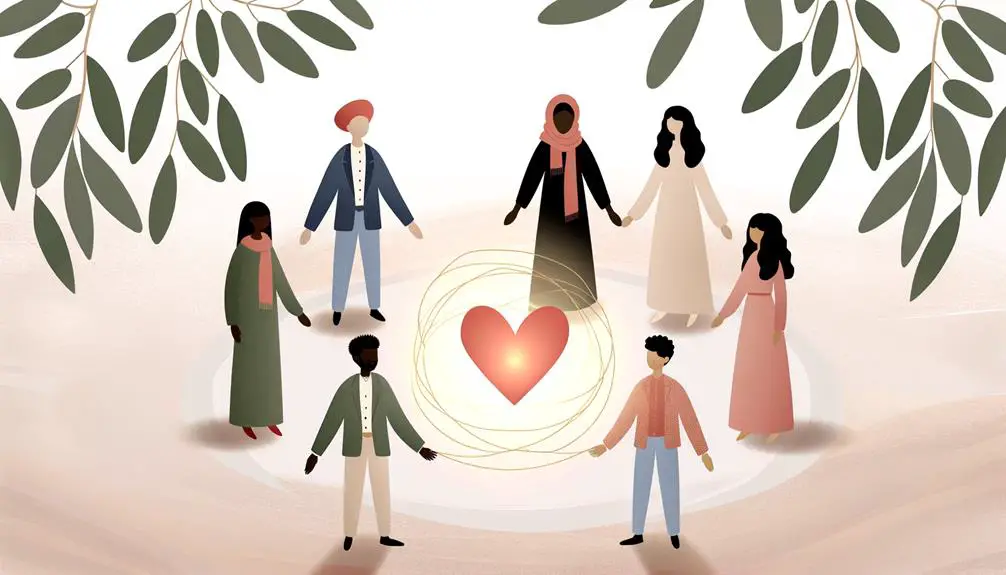Kindle your understanding of 'One Another' statements in the Bible and discover how they revolutionize relationships.

One Another Statements in the Bible
As you walk through the garden of Scripture, you'll find that the 'One Another' statements scattered throughout the Bible are not just ornamental but deeply rooted in the essence of Christian love and community. These directives, from loving and forgiving to encouraging and bearing each other's burdens, form the backbone of how believers are called to live in harmony.
They challenge you to look beyond yourself and consider how your actions and attitudes impact those within your sphere. Unpack these timeless principles further, and you'll uncover layers of wisdom that are as relevant today as they were two millennia ago.
Why not explore how these biblical instructions can transform your interactions and relationships in the modern world?
Key Takeaways
- Love is the core principle behind 'One Another' statements, emphasizing action and heart transformation.
- 'One Another' statements encourage building supportive communities through encouragement, mutual respect, and shared joy.
- They call for sharing burdens and practicing forgiveness to foster empathy, resilience, and healing within the community.
- These statements promote spiritual growth and unity through prayer partnerships, community worship, and mutual intercession.
The Essence of Love

At the heart of the 'One Another' statements in the Bible, love emerges as the foundational principle guiding interpersonal relationships. This isn't merely a suggestion but a divine commandment, deeply rooted in the fabric of Christian doctrine. You're called to love your neighbor as yourself, a directive that goes beyond mere sentiment or emotion. It's a call to action, a mandate for heart transformation that requires you to look beyond your own needs and desires.
This divine commandment isn't just about fostering positive feelings towards others; it's about embodying the love that Christ showed. It's a love that sacrifices, serves, and uplifts, extending grace and forgiveness even when it's not deserved. You're not just asked to love those who are easy to love but also those who challenge you, reflecting the unconditional love that God has for humanity.
The essence of love, as outlined in these biblical statements, is transformative. It's not static or limited to certain conditions. It's active, seeking out ways to support, encourage, and care for one another in a reflection of divine love. This heart transformation is critical because it's not something you can achieve on your own. It requires divine intervention, prayer, and a willingness to be molded and shaped by God's hand.
Encouraging Each Other

Frequently, the biblical mandate to encourage one another serves as a pivotal component in building and sustaining a vibrant, supportive community of faith. This directive, deeply rooted in scripture, calls for an intentional cultivation of mutual respect and shared joy among believers. It's not merely about offering comfort in times of distress; it extends to fostering an environment where individuals feel valued, understood, and inspired to grow in their spiritual journey.
The concept of encouragement in the Bible transcends superficial compliments. It involves genuine, heartfelt affirmations that acknowledge the God-given worth and potential in each person. You're encouraged to see beyond the immediate struggles or achievements of your peers, recognizing the deeper value they bring to the collective body of Christ. This practice of uplifting one another isn't just beneficial for the receiver; it enriches the giver, creating a cycle of positive reinforcement and spiritual growth within the community.
Moreover, encouragement is closely linked to the notion of mutual respect. You're called to listen actively, speak kindly, and offer support that respects the individual's dignity and autonomy. This respectful interaction fosters a sense of belonging and unity, essential ingredients for a thriving faith community.
Shared joy, another key aspect of encouragement, involves rejoicing in each other's successes and milestones as if they were your own. This communal celebration of achievements and blessings strengthens the bonds between members, reminding everyone of the collective journey they share in faith.
Bearing Burdens Together

In the tapestry of biblical teachings, bearing one another's burdens emerges as a profound expression of love and solidarity within the community of faith. This practice isn't merely about offering a helping hand in times of need; it's deeply rooted in the scriptural understanding of shared struggles and collective resilience. You see, when you bear another's burdens, you're participating in a divine mandate that strengthens communal bonds and reflects the interconnectedness of humanity as envisioned by the Bible.
This act of bearing invokes not just a temporary alleviation of someone's troubles but a deeper, more substantive form of support. It's about recognizing that everyone's well-being is intertwined, that your liberation is bound up with mine. This biblical principle challenges you to look beyond your individual concerns and to embrace a broader vision of collective well-being.
Moreover, the concept of bearing burdens together doesn't exist in isolation. It's part of a larger biblical narrative that emphasizes compassion, empathy, and mutual support. By sharing in each other's struggles, you not only provide practical assistance but also affirm the inherent value and dignity of every individual. This mutual bearing of burdens fosters a sense of collective resilience, enabling communities of faith to withstand trials and tribulations together.
Thus, bearing one another's burdens is more than a moral directive; it's a transformative practice that redefines relationships, nurtures empathy, and cultivates a resilient community. It's a vivid demonstration of love in action, where shared struggles become the soil from which collective resilience and solidarity grow.
Forgiving and Forbearing

Building on the foundation of bearing one another's burdens, forgiving and forbearing represent the next critical steps in fostering a community characterized by deep, enduring connections and mutual respect. These practices aren't mere suggestions; they're imperative for the health and growth of any community, especially within the context of faith. Forgiveness and forbearance are intertwined, each facilitating the other in the journey toward heart healing and effective conflict resolution.
Forgiveness, in its essence, is an act of the will. You choose to release feelings of resentment or vengeance towards someone who's wronged you, regardless of whether they actually deserve your forgiveness. It's a pivotal step in heart healing, allowing you to move forward without the heavy chains of bitterness.
Forbearance, on the other hand, involves patience and self-control. It means you're choosing to exercise restraint or tolerance when annoyed or wronged. It's about holding back the immediate impulse to respond in kind, giving space for understanding and grace to flourish.
Consider these critical aspects of forgiving and forbearing:
- Empathy: Understanding the other person's perspective can pave the way for forgiveness and patience.
- Humility: Acknowledging your own imperfections can make it easier to forgive those of others.
- Communication: Open, honest dialogue can resolve misunderstandings that might otherwise lead to resentment.
- Commitment: A steadfast dedication to these principles, even when it's difficult, ensures the stability and maturity of relationships.
Incorporating forgiveness and forbearance into your life isn't just about improving your relationships with others; it's also about your own personal growth and heart healing. These practices are integral for any meaningful conflict resolution and are foundational in building a resilient, compassionate community.
Spurring Spiritual Growth

Spurring spiritual growth demands an intentional focus on practices that deepen one's faith and understanding. In the context of 'One Another' statements found in the Bible, this isn't merely about individual pursuits but is deeply entrenched in communal activities that foster a collective spiritual journey. Prayer partnerships and community worship stand out as pivotal pillars in this endeavor.
Prayer partnerships, a practice where individuals pair up or form small groups to pray for one another, reflect a biblical mandate to 'pray for one another' (James 5:16). This mutual intercession not only strengthens individual faith but also knits the community closer, embodying the essence of bearing one another's burdens (Galatians 6:2). It's a tangible expression of faith that acknowledges the power of collective supplication and the importance of spiritual solidarity.
Similarly, community worship acts as a crucible for spiritual transformation. It's not just a gathering; it's a confluence of shared experiences, testimonies, and spiritual gifts that edify the body of Christ. Ephesians 5:19 encourages believers to speak to one another with psalms, hymns, and songs from the Spirit. This directive highlights how communal worship isn't just about individual edification but about mutual encouragement and growth.
The analytical lens through which we view these practices reveals their foundational role in spurring spiritual growth. They're not ancillary activities but central to the fabric of a vibrant, growing faith community. Engaging in prayer partnerships and participating in community worship are thus not just recommended; they're essential for anyone seeking to deepen their faith and understanding in a communal context.
Frequently Asked Questions
How Do "One Another" Statements in the Bible Vary Across Different Translations and Versions?
When you explore how translations and versions vary, you're diving into a world of translation accuracy and linguistic variations. Different versions often reflect diverse interpretations, influenced by linguistic nuances and cultural contexts.
This variation can significantly alter the meaning of phrases, emphasizing the importance of examining multiple translations for a fuller understanding. Such differences underscore the complexity of accurately translating texts, making your exploration both challenging and enriching.
Are There Any "One Another" Statements That Are Specific to Certain Books of the Bible or Particular Authors, Like Paul or John?
Yes, specific 'one another' statements are tied to certain books or authors, such as Paul or John, in the Bible. They often have a love emphasis, reflecting the cultural context of the times.
For example, Paul's letters to the early churches highlight unity and love among believers. John's writings, especially his letters, emphasize loving one another as a testament to following Jesus. Each author's unique perspective enriches the understanding of these statements.
How Have Interpretations of "One Another" Statements Evolved Over Time Within Different Christian Denominations?
You've stumbled upon a fascinating topic: how interpretations of key phrases have morphed across Christian denominations. It's like watching a theological game of telephone.
Through ecumenical dialogues and amidst historical controversies, these interpretations have evolved, sometimes diverging wildly. This evolution reflects broader theological shifts and the nuances of scripture understanding.
Analyzing these changes offers deep insights into the dynamics of faith communities and their approaches to biblical teachings.
Can "One Another" Statements Be Applied in a Modern Context Outside of the Church, Such as in the Workplace or in Social Activism?
Absolutely, you can apply these principles in modern contexts such as the workplace or social activism. By integrating the core values of corporate ethics and social empathy, these teachings advocate for mutual respect, understanding, and cooperation.
They encourage you to foster an inclusive environment, championing teamwork and empathy. In essence, they serve as a moral compass, guiding you towards building more compassionate and ethical communities and organizations.
What Are the Challenges in Practicing the "One Another" Statements in a Multicultural and Multi-Faith Society?
In a world where "variety is the spice of life," you'll find the challenge lies in practicing inclusivity amidst diversity. Cultural sensitivity becomes paramount; it's not just about respecting differences but genuinely understanding them.
Similarly, engaging in interfaith dialogue requires an open mind and heart, recognizing the unique perspectives each faith brings to the table. Navigating these complexities demands patience and empathy, as you strive to create a space where everyone feels valued and heard.
Conclusion
In essence, the biblical 'one another' statements serve as a foundational blueprint for cultivating a community rooted in love, encouragement, and mutual support.
By engaging in actions of forgiveness, bearing each other's burdens, and fostering spiritual growth, you're not just adhering to ancient wisdom but actively participating in a timeless tradition.
This engagement transcends mere ritual—it's a lived ethos.
Thus, in the ebb and flow of life, these principles stand as a testament to the enduring power of communal bonds and spiritual resilience.



Sign up